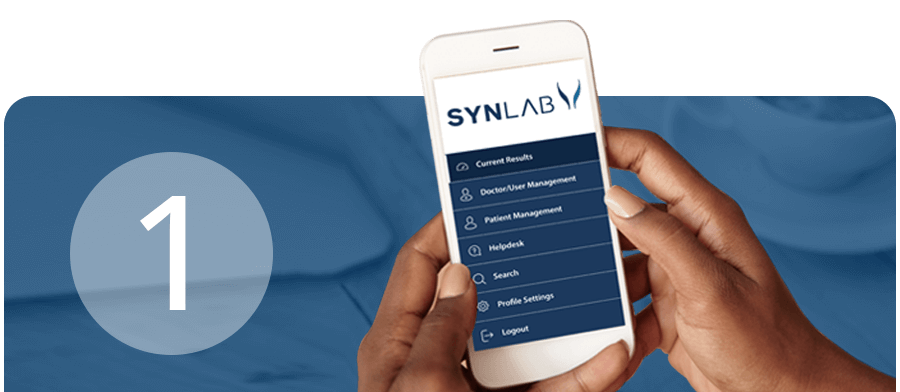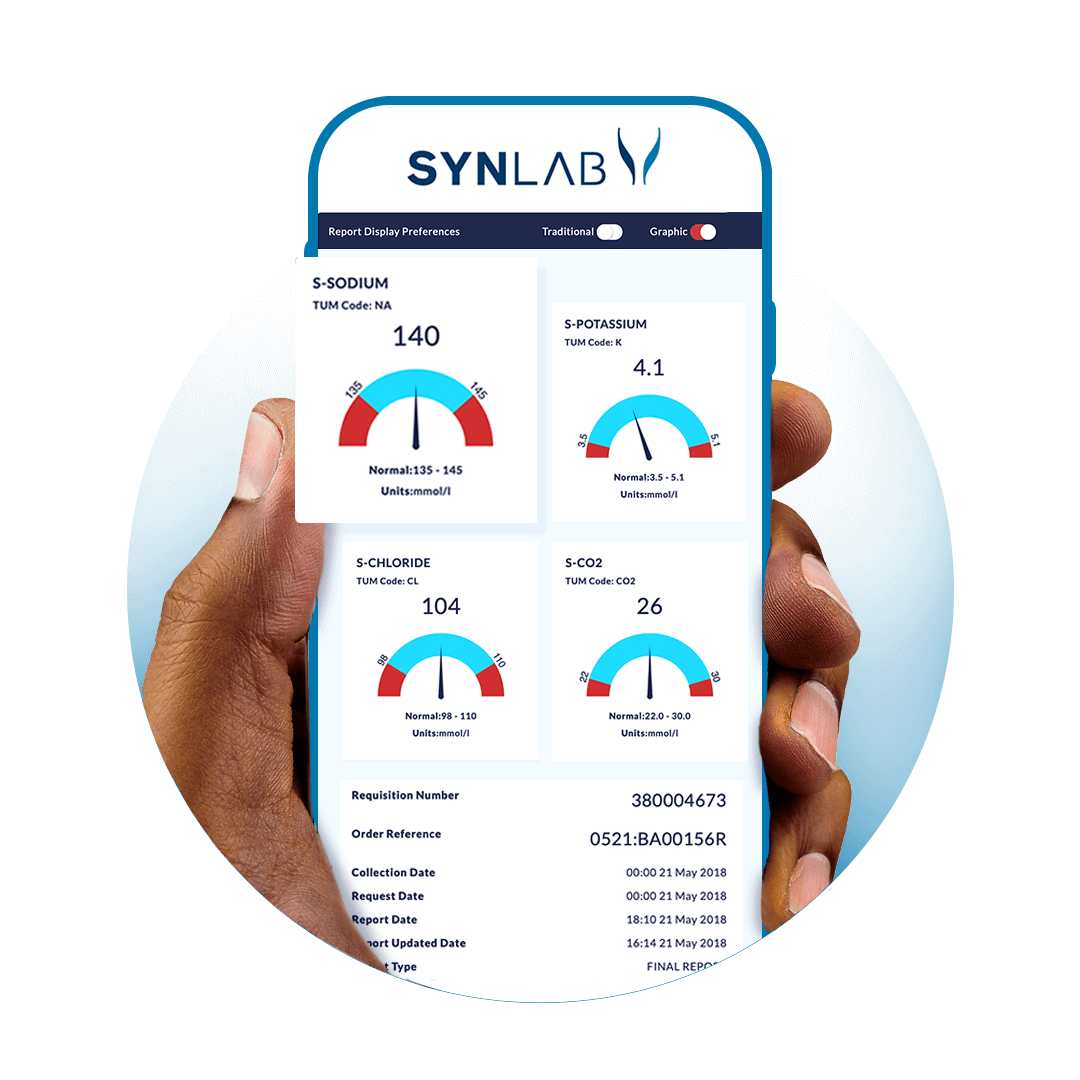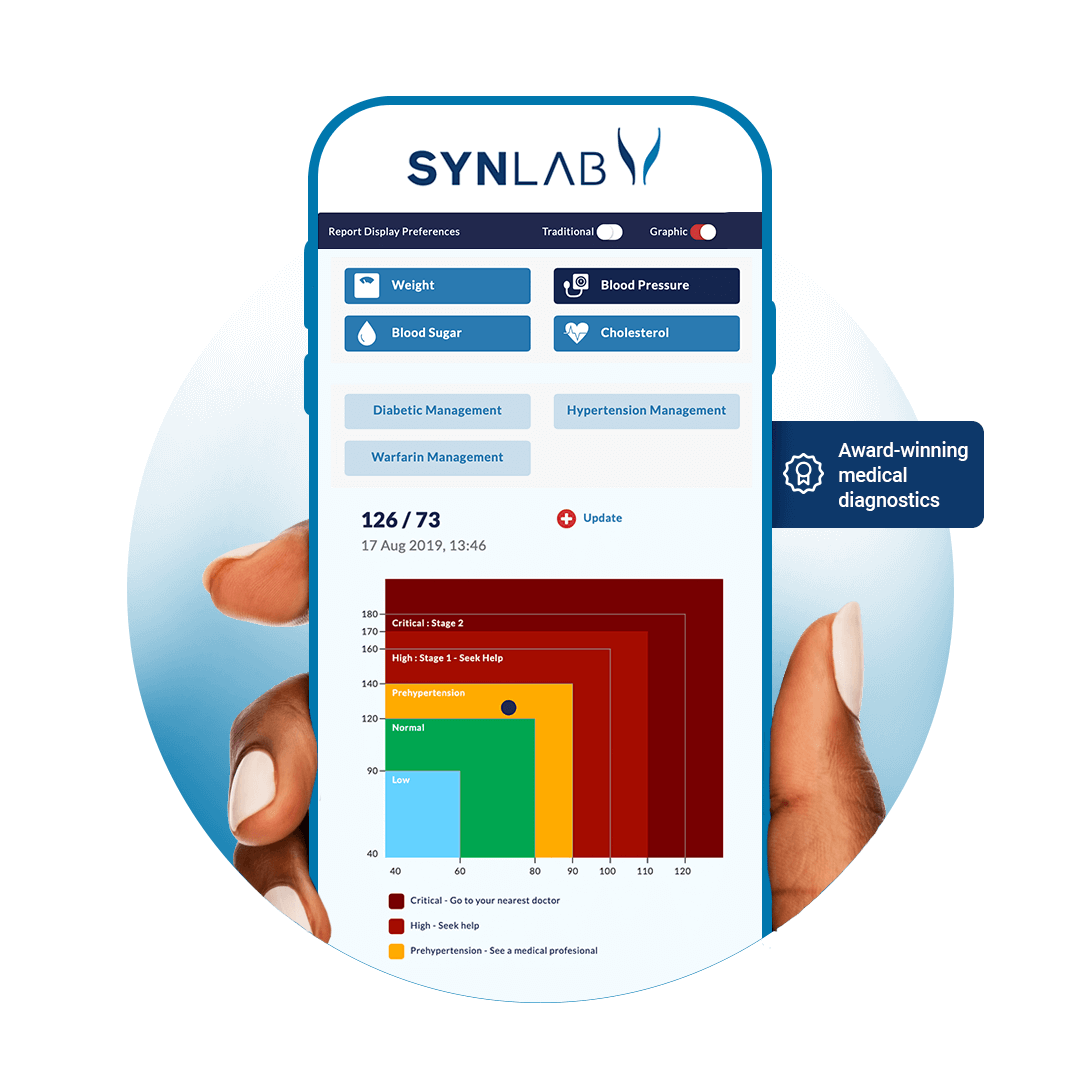Female Fertility
Trouble getting pregnant? Fertility tests can identify the cause(s) of infertility so the condition can be properly treated and give you the best chance to conceive. Get screened. Take control of your health.
Confidential
Quick turnaround
Reliable accuracy
This panel gives information of the number and quality of eggs present in a woman’s ovary which may, following fertilisation, result in a healthy and successful pregnancy
A comprehensive test that providing a detailed assessment of the hormones that are involved in the control of a woman’s reproductive ability.
How it works

Order online
Order your test online, select, and pay for your preferred panel.

Collect your sample
Choose to have our medical team come in for home sample collection or visit a Synlab centre near you for your sample collection.

Review accurate results
Accurate and confidential results are available on your secure online Pathprovider account. You will get notified as soon as your results are available.

Get medical support
If you have any queries, please contact our 24-hour customer support centre at +234 700 7284 2273.
STATISTICS
1 in 3
Couples are affected by infertility.
#1
Hormonal imbalances are the number one cause of infertility in women.
#1
Tubal disease is the leading cause of infertility in Nigeria.
Infertility is the result of a disease of the male or female reproductive system, which results in a failure to achieve a pregnancy after 12 months or more of regular unprotected sexual intercourse.
Most of the time, the only symptom of infertility is an inability to achieve a pregnancy.
Other symptoms for women can include
- Absence, abnormal, irregular or painful periods
- Skin changes, including more acne
- Dark hair growth on the lips, chest and chin
- Unexplained weight gain
- Hot flashes
- Painful intercourse or inability to have intercourse
- Milky breast discharge
Causes of female fertility problems
Various medical issues can contribute to female fertility problems, including
Ovulation disorders which affect the release of eggs from the ovaries. These include hormonal conditions such as polycystic ovary syndrome, hyperprolactinemia and thyroid problems (hyperthyroidism or hypothyroidism).
Uterine or cervical abnormalities, such as polyps or fibroids in the uterus.
Fallopian tube damage or blockage is often caused by pelvic inflammatory disease.
Endometriosis occurs when tissue that normally lines the inside of the uterus grows outside the uterus.
Primary ovarian insufficiency (early menopause) occurs when the ovaries stop working and menstruation ends before age 40.
Pelvic adhesions (bands of scar tissue that bind organs after pelvic infection, appendicitis, or abdominal or pelvic surgery.)
Medical conditions associated with the absence of menstruation such as poorly controlled diabetes, celiac disease and some autoimmune diseases such as lupus.
Age also plays a role. Delaying pregnancy can decrease the likelihood that you’ll be able to conceive.
A decline in the quantity and quality of your eggs with age makes it harder to conceive.
Facts about fertility
Lifestyle
Certain lifestyle factors such as heavy smoking, drinking and use of recreational drugs, particularly marijuana, are known to impact one’s fertility potential.
Age
From the age of 32, a woman’s chances of becoming pregnant begin to decrease. By the age of 35, this decline becomes more rapid. As a fetus, women will carry between 5 and 7 million eggs. By the time a woman is going through menopause, they will have 1,000 eggs. By the time a woman is 40 years old, there is only a 5% chance of becoming pregnant.
Stress
Chronic stress can trigger the overproduction of cortisol in men and women, causing hormonal imbalances and, thus, a decreased likelihood of healthy conception.
Weight
Maintaining a healthy weight for your height or body mass index (BMI) can increase your chances of a healthy pregnancy and delivery. For most adults, a healthy BMI is between 18.5 and 24.9. You can calculate your BMI online using a BMI calculator.
Timing
The “fertile window” in women refers to the six days before ovulation. The lifespan of spermatozoa is five days, and the lifespan of an ovum is 24 hours. Having sex every second day in the six days leading up to the release of the ovum increases the likelihood of healthy conception.
Sexual Health
It’s of great importance that you take regular sexual health tests before attempting to become pregnant. Many people believe that STDs don’t affect pregnancy, and many are asymptomatic; however, chlamydia, for example, can cause pelvic inflammatory disease (PID), leading to infertility.
Nutrition
A varied diet with an adequate supply of calcium, protein, and iron is essential in fuelling the body correctly. Calcium, folic acid, healthy fats, vitamin B12, vitamin D and iron are particularly important for a healthy pregnancy.
Frequently Asked Questions
If you are still unsure about this test, here are some questions that we usually get asked.
Still need answers?
Is infertility just a “women’s problem?"
No, infertility is a medical problem that affects both men and women. Approximately 35% of infertility is due to a female factor, and 35% is due to a male factor. In the balance of cases, infertility results from problems in both partners or in some cases, the cause of infertility cannot be explained.
What is progesterone, and what does it do?
Progesterone is a hormone released by the ovaries. It helps to regulate your cycle. But its main job is to get your uterus ready for pregnancy. After ovulating each month, progesterone helps thicken the uterus lining to prepare for a fertilised egg. If there is no fertilised egg, progesterone levels drop, and menstruation begins.
What causes infertility in women?
Problems with ovulation account for most cases of infertility in women. Without ovulation, there are no eggs to be fertilised. Some signs that a woman is not ovulating normally include irregular or absent menstrual periods. Less common causes of fertility problems in women include:
- Blocked fallopian tubes due to pelvic inflammatory disease, endometriosis or surgery for an ectopic pregnancy
- Physical problems with the uterus
- Uterine fibroids
When should I see a doctor?
Fertility testing should be scheduled if: a woman is younger than 35 and has been trying to get pregnant for one year with no success or if a woman is over the age of 35 and has been trying to get pregnant for six months with no success.
Benefits
When you get your test done with SYNLAB, you have access to our benefits.
Customer-centric reporting
PathProvider gives you direct access to all of your test results and reports across all your devices without having to leave your home.
Benefits of being a PathProvider registered user
- Your profile is a secure personal space
- Access your results any time, any day, all year round
- Results can be checked on any smartphone, computer, or tablet
- All your previous results are archived on your profile
- Set your notification preferences when results are ready. Choose email or SMS.
- Not a doctor? Switch to the popular ‘graphic view’ and get to understand your results.
- You can share or print your results directly from your profile.


Choose home collection.
Get complete convenience
Get your results as they become available online.
You can choose to get your entire family tested in the comfort of your own home. Choose a day and a time that is convenient for you, and we’ll send one of our trained professionals to your door.
No more sitting in traffic. Now you can manage your health in the comfort of your own home.
Total confidence.
Award-winning medical diagnostics
Accuracy of results, reliability, trust, and quick turnaround time.
We are audited by an external body which ensures that we implement the highest ethical standards and international best practices.
SYNLAB was awarded the 'Private Laboratory Service Provider of the Year' in Nigeria award by the Nigeria Health Excellence Awards (NHEA).

Select the test that’s right for you
A comprehensive panel provides more information on a wider range of STIs.
Our most advanced wellness panel. It gives a detailed assessment of liver function and structure, kidney structure and function, diabetes mellitus, thyroid function, bone health, blood disease, risk of heart and blood vessel disease, Immunity, urinary tract health, and illnesses associated with chronic inflammation.
It also checks for cervical and colon cancer.
This panel gives insight into the hormonal changes that may indicate a transition into and the attainment of menopause.